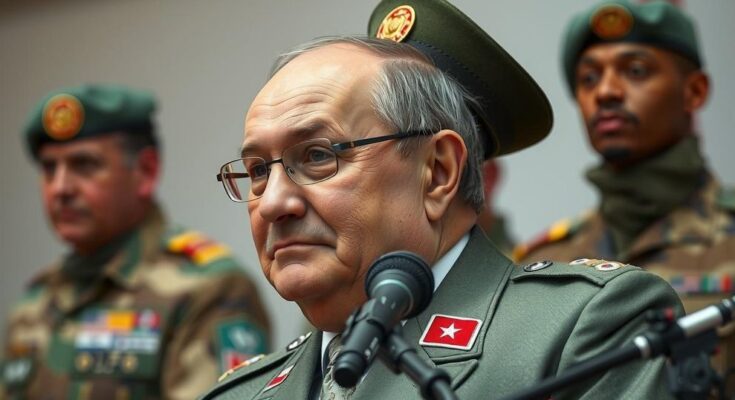Libyan Prime Minister Abdul Hamid Dabaiba opposes Russia’s efforts to strengthen its military presence in eastern Libya. Citing concerns over transforming Libya into a battleground for international conflicts, he emphasizes the need for sovereignty and foresees that such foreign interventions may complicate the internal crisis even further. His remarks reflect potential alignment with U.S. interests amidst rising economic pressures, particularly relating to oil revenue oversight.
The Libyan Prime Minister, Abdul Hamid Dabaiba, is firmly opposing Russia’s efforts to bolster its military presence in eastern Libya. Speaking against the backdrop of heightened geopolitical tensions following Syria’s recent regime shift, Dabaiba emphasized that Libya should not serve as a battleground for international power struggles. He expressed concerns over foreign military interventions complicating Libya’s internal conflicts, underscoring that such developments would not be tolerated by his government.
Dabaiba revealed his apprehensions regarding reports of Russian military reinforcements transferring equipment from Syria to eastern Libya, where a rival administration aligned with military leader Khalifa Haftar has long received Russian backing. He noted, “No one with an ounce of patriotism wants a foreign power to impose its hegemony and authority on the country and the people.” In dialogue with the Russian ambassador, he demanded clarifications on these actions.
The ongoing Libyan strife, heightened since the 2011 NATO-supported uprising that toppled longtime dictator Muammar Gaddafi, has left the nation fragmented between the Tripoli-based UN-recognised government and Haftar’s eastern administration. Dabaiba’s remarks may reflect his desire to align more closely with the United States, which has begun applying economic pressure on Libyan officials amid allegations of corruption and mismanagement of resources, particularly in the oil sector. Economic oversight by the US aims to ensure better transparency in Libya’s financial dealings, with potential audits revealing significant financial misconduct related to oil smuggling and illicit Russian connections.
Remarkably, political experts view Dabaiba’s statements as indicative of a significant shift in Libya’s diplomatic stance as he navigates the complexities of international relations against a backdrop of internal fragmentation and external influences from Russia. Furthermore, recent intelligence indicates that Russia has intensified its logistical operations, transporting military supplies to Libya, which raises potential ramifications for the region’s stability and security.
Libya has been embroiled in conflict since the 2011 uprising that ended Gaddafi’s regime, leaving a divided nation contesting power between a UN-backed government in Tripoli and an eastern administration led by Khalifa Haftar. The resultant chaos has made Libya a site for foreign intervention, with various states, including Russia, pursuing strategic interests by supporting different factions. The recent overthrow of Bashar al-Assad’s regime in Syria has further complicated the geopolitical dynamics, prompting Russia to reinforce its military bases in Libya. This has raised alarms among Libyan leaders, who are wary of turning Libya into another battlefield for international disputes. Moreover, with mounting economic pressures from the United States aimed at curtailing corruption, Libyan officials are under scrutiny regarding financial oversight, particularly concerning oil revenues essential for the national economy. The Libyan Central Bank’s recent letter, indicative of American apprehensions over the management of oil sales and financial transactions, reflects the urgent need for transparency to avoid sanctions that could worsen Libya’s precarious financial status.
In summary, Prime Minister Dabaiba’s firm stance against Russian military reinforcements showcases Libya’s ongoing struggle for sovereignty amidst rising foreign intervention. His remarks serve as a pivotal moment in the context of Libya’s geopolitical landscape while signaling a potential alignment with the US against external influences, particularly concerning ongoing economic pressures and the need for greater transparency in oil revenue management. The unfolding situation remains critical as Libya navigates its path toward stability and governance, free from foreign dominance.
Original Source: www.theguardian.com




